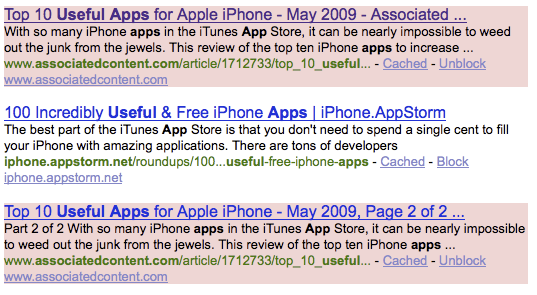
Yesterday, Google released a Chrome browser extension that lets users block certain websites from showing up in their Google search results. That way, if you never want to see an eHow article again, you don’t have to. Kynetx, a company that offers developers a single platform for building extensions for multiple browsers, saw the announcement and immediately offered $500 to the first person that could create an extension “with the same functionality for all 3 browsers and all 3 major search engines.”
Less than a day later, the company has announced a winner and released the extensions.
The company explained the reasons for the contest and the rules in a blog post yesterday after Google’s announcement:
We think this is a very useful tool, we run into spam results way too often. The only problem is that this extension works only in Google Chrome on Google. Kynetx makes it brain-dead simple to build an extension for Chrome, Firefox and IE that will annotate search results on Google, Yahoo and Bing.
Kynetx works by providing an AppBuilder tool and a rule-based language to create browser extensions that operate similarly to GreaseMonkey.
The extensions, which are available for Internet Explorer, Chrome and Firefox, function nearly identically to the one put out by Google yesterday. When you get a page of search results, if you don’t want to see a certain domain any more, you simply click the “block” link next to that result. At the end of your search results, it will tell you if something has been blocked and you can click to see the blocked results (the highlighted entries in the screenshot below).

The big difference, of course, is that these extensions work with the top three most used browsers as well as the top three search engines. If you block something on one browser, it automatically synchronizes and keeps that domain blocked in other browsers too. The same goes for search engines. If you block something in Bing, it will be blocked in both Yahoo and Google.
Ed Orcutt, a developer based in Highland, Utah won the $500 prize by getting there first. This is the second time around for Orcutt, who also won another Kynetx contest by creating HoverMe, an extension that helps Twitter and Facebook users discover where their friends hang out on the social Web.
All of the extensions are now available at PersonalBlock.com.










